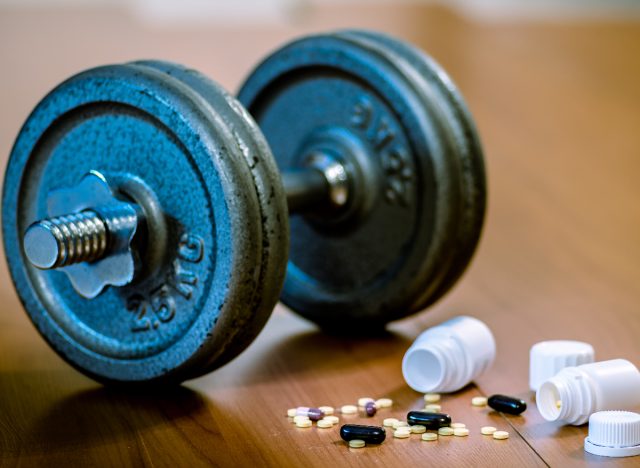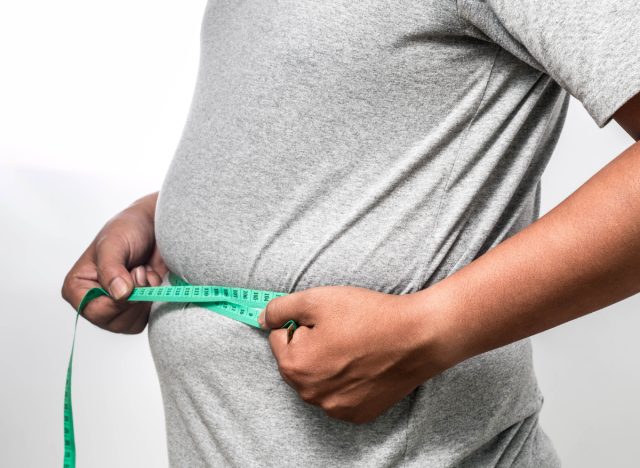5 Daily Habits That Can Decrease Testosterone

As you grow older, it's a natural process for your testosterone levels to decrease. Many individuals won't be bothered by this occurrence, while others could be dealing with what's known as "low testosterone." This condition brings on the symptoms of having low testosterone levels, such as sleep issues like insomnia, bone loss, depression, difficulty concentrating, an increase in body fat, and a decline in muscle size and strength. If you fall under this bracket, it's crucial to speak with a healthcare professional, because there might be an issue (with how parts of your brain are functioning or how the tests are working) that's at the root of the condition, says Mike Bohl, MD, MPH, ALM, a member of our Medical Expert Board and a certified personal trainer and nutrition coach. In addition, there are some specific daily habits that can decrease testosterone levels, which Dr. Bohl shares with us today.
It's always a smart idea to speak with your healthcare provider if you feel anything is off. They will most likely recommend you take a blood test so you can see your testosterone level, MedlinePlus reports. They will also check you for other issues that may be wreaking havoc in the background, such as side effects of any medication you're taking, depression, or thyroid issues.
"While there are a couple of specific things to avoid that could be hurting your testosterone levels, maintaining testosterone levels is mostly a matter of following general tips for living a healthy lifestyle," Dr. Bohl adds. Below, he outlines some habits that can decrease testosterone levels, so listen up and read up! And when you're finished, be sure to check out the 7 Testosterone-Killing Foods You Should Always Avoid.
1. Taking anabolic steroids

Using anabolic steroids (which some individuals might do for bodybuilding purposes) or exogenous testosterone can actually shut down your body's natural production of testosterone, Dr. Bohl explains. Instead of taking anabolic steroids, he recommends sticking to healthy nutrition for your workouts, such as consuming carbs and caffeine before exercising and a protein-rich diet during the day.
2. Not getting enough solid sleep
Not getting enough restful sleep is another one of Dr. Bohl's daily habits that can decrease testosterone. According to the Sleep Foundation, adults 18 years of age and older should get at least seven hours of solid sleep on a nightly basis. It's crucial to follow just the right nighttime routine to ensure you're getting the right amount of Z's you need. Habits like following the same bedtime and wake-up time every day, sleeping on a cozy and supportive mattress, powering down your blue-light-emitting electronics far before heading to bed, and not consuming caffeine or alcohol before hitting the sheets can all promote good sleep hygiene.
3. Having excess body fat

Being overweight or obese can also be the culprit behind your low testosterone levels. "The best way to manage weight is by following a healthy diet, including eating a diet rich in fruits and vegetables, whole grains, healthy fats (monounsaturated and polyunsaturated fats), and lean proteins," Dr. Bohl explains.
4. Leading a sedentary lifestyle
We all know the dangers of leading a sedentary lifestyle, but were you aware this bad habit can also decrease testosterone? Along with carrying around excess body fat, being sedentary is a major "risk factor for low testosterone," Dr. Bohl tells us. So get up and active!
The Physical Activity Guidelines for Americans recommends adults get in a minimum of 150 minutes (two and a half hours) of moderately intense physical activity or at least 75 minutes (1 hour and 15 minutes) of vigorous exercise each week. Moderately intense aerobic exercise could be brisk walking, while vigorous aerobic exercise could be running or jogging. Two days of strength training is also crucial.
5. Taking specific medications
Certain medications like painkillers can cause your testosterone levels to decline as a side effect. If you're worried this may be the case, it's important to speak with a healthcare professional about the medication you're taking to see if there are any alternatives available, Dr. Bohl recommends.









